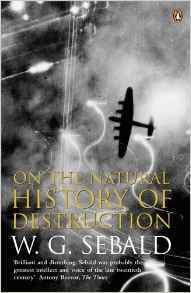
Book Review Summary: On the Natural History of Destruction
Introduction
"On the Natural History of Destruction" by W.G. Sebald is a controversial book that delves into the devastation of German cities during World War II and the reasons for the absence of this traumatic event from German history and culture. Sebald, a German writer and academic, explores the impact of area bombing on German cities and examines the cultural amnesia surrounding this topic. His analysis of the trauma and its effects on both perpetrators and victims has sparked debate and reflection among readers. In this article, we will analyze common opinions and feelings expressed by readers about this thought-provoking book.
About W.G. Sebald
Winfried Georg Maximilian Sebald was a German writer and academic known for his works that explore themes of memory, loss of memory, and identity. His novels and essays are deeply rooted in meticulous observation and are characterized by a sense of horror and sensitivity. Sebald's writing is often described as a reconciliation with the trauma of the Second World War and its impact on the German people. His contributions to German literary criticism and politico-cultural analysis have earned him critical acclaim and recognition as one of the greatest living authors.
Analysis of Views
-
The Harrowing Investigation: Readers praise Sebald's harrowing and precise investigation into the devastation of German cities during World War II. They appreciate his meticulous research and the way he brings to light the unprecedented trauma that was largely ignored in German history and culture. The book's focus on the bombing of German cities and its impact on civilians resonates with readers who are interested in historical events and their aftermath.
-
The Absence of Trauma: Many readers find Sebald's analysis of the absence of trauma related to the bombing of German cities intriguing. They agree that there is a deliberate cultural amnesia surrounding this topic, with writers seeking to justify their actions under the Nazis rather than addressing the traumatic experiences of civilians. Sebald's exploration of this cultural void sparks discussions on the reasons behind it and its implications for understanding the past.
-
The Morality of Artistic Decisions: Readers appreciate Sebald's examination of the morality hidden in artistic decisions made during times of war. They find his exploration of how writers responded to the trauma of war and its aftermath thought-provoking. Sebald's analysis highlights the complexities of artistic expression in times of conflict and raises questions about the responsibility of artists in portraying the truth.
-
The Sensitivity of Intelligence: Sebald's writing is often described as sensitive and intelligent. Readers appreciate his ability to convey complex ideas and emotions with clarity and restraint. They find his writing style engaging, with moments of black humor that add depth to his exploration of trauma and loss. Sebald's sensitivity as a writer is praised for its ability to evoke empathy and understanding in readers.
-
The Relevance Beyond Germany: Readers appreciate the relevance of Sebald's book beyond the German context. They find his exploration of trauma, memory, and cultural amnesia applicable to other societies that have experienced collective trauma. Sebald's insights into dealing with a society's traumatic past experiences resonate with readers from various backgrounds, making his book a valuable contribution to understanding the human experience.
Reasons for Recommendation
-
Thought-Provoking Content: Readers recommend "On the Natural History of Destruction" for its thought-provoking content. The book challenges readers to confront the traumatic events of World War II and their impact on German culture. Sebald's exploration of cultural amnesia and the silence surrounding the bombing of German cities provokes reflection on the importance of remembering historical events and their consequences.
-
Meticulous Research: Readers appreciate Sebald's meticulous research, which adds depth to his analysis. His thorough examination of historical sources, literary works, and personal experiences provides a comprehensive understanding of the impact of war on individuals and society. Sebald's attention to detail makes his book a valuable resource for those interested in exploring the complexities of war and its aftermath.
-
Engaging Writing Style: Sebald's writing style is praised for its engagement with readers. His ability to convey complex ideas with clarity and sensitivity makes his book accessible to a wide audience. Readers find his writing style captivating, with moments of black humor that add depth to his exploration of trauma and loss. The overall engagement with Sebald's writing style is a significant reason for recommending this book.
Reasons for Not Recommendation
-
Limited Focus: Some readers find that "On the Natural History of Destruction" has a limited focus compared to Sebald's other works. While they appreciate his exploration of the bombing of German cities, they feel that the book lacks a broader scope that would allow for a more comprehensive understanding of war and its impact on society. The limited focus may leave some readers feeling dissatisfied with their reading experience.
-
Personal Preferences: Personal preferences play a role in whether readers recommend or not recommend "On the Natural History of Destruction." Some readers may find Sebald's writing style or subject matter too academic or challenging for their taste. They may prefer more straightforward narratives or a different approach to exploring historical events. Personal preferences can influence whether readers find this book engaging or not.
Conclusion
"On the Natural History of Destruction" by W.G. Sebald is a thought-provoking book that delves into the devastation of German cities during World War II and examines the absence of trauma surrounding this event in German history and culture. Readers appreciate Sebald's harrowing investigation, his exploration of cultural amnesia, and his sensitivity as a writer. The book's relevance beyond Germany makes it a valuable contribution to understanding collective trauma and its impact on society. While some readers may find it limited in scope or prefer different writing styles, overall, "On the Natural History of Destruction" is recommended for those interested in historical events, trauma, memory, and cultural amnesia.